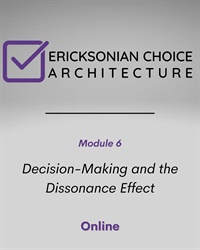Ericksonian Choice Architecture - Module 6 - Decision-Making and the Dissonance Effect - Online Registration
- Average Rating:
- Not yet rated
- Topic Areas:
- Not Available
- Faculty:
- Dan Short, PhD | Michael Langer, PCC
- Duration:
- 3 Hours
Tags: Upcoming ECA
Description
This course focuses on expanding self-regulation by incorporating emotional, autonomic, and non-volitional behaviors into decision-making. Participants will learn how to help clients manage spontaneous urges and align their actions with personal values. The course explores how to facilitate greater self-control and behavioral alignment by creating supportive environments and integrating strategic default options to encourage beneficial behaviors.
In practical demonstrations, participants will practice designing physical and social environments that remove obstacles, reduce choice overload, and make it easier for clients to achieve their goals. Concepts such as nudge theory, emotional granularity, and affect reframing will be used to show how small adjustments can lead to significant improvements in behavior and decision-making.
Key Concepts Covered:
- Self-Regulation Theory
- Nudge Theory
- Emotional Granularity
- Affect Reframing
- Friction vs. Ease of Use
- Choice Overload
- Segmentation Effect
- Temptation Management
We are working on getting ICF, International Coaching Federation, credits attached to the classes. This is not a guarantee that we will be accredited. We are working on trying to have these available by the first class.
Credits
Faculty

Dan Short, PhD Related Seminars and Products
Dan Short, Ph.D, is internationally recognized for his work in Ericksonian hypnosis and short-term therapy. He devotes most of his time to a private practice in Scottsdale, AZ, while also writing and teaching to professional audiences around the globe. His training is diverse, having graduated with a Masters in Counseling from the University of North Texas in 1993, a doctoral degree in Counseling Psychology from the University of Massachusetts, Amherst; followed by an internship at an APA accredited program in Houston Texas.

Michael Langer, PCC Related Seminars and Products
While other executive coaches may use pre-set frameworks and prompts that are applied across clients, I take a personalized and tailored approach. Rather than simply providing operational processes or tactical guidance, I focus on helping clients understand and address their core personal drivers that directly impact their effectiveness and success. This deep level of understanding and support enables clients to overcome the unique challenges and obstacles they face, and unlock their full potential as leaders.
One of the things that sets me apart as an executive coach is my ability to hold clients accountable and challenge them in a constructive way. I don't shy away from difficult conversations or give in to pressure or manipulation. Instead, I help clients develop the self-awareness, empathy, and communication skills they need to build strong, effective relationships and achieve their goals.
As an executive coach, my passion is in driving deep and sustainable change with senior leaders at the individual, team, and organizational levels. I use evidence-based neuroscience to guide my approach, applying this knowledge to key areas such as interpersonal conflict, communication, and culture change.
I have extensive experience working with senior executives and startup founders in the US, Asia, the Middle East, and Europe. My clients come from a diverse range of industries, including banking, tech, gaming, biotech, aerospace, and automotive.
I have successfully coached hundreds of individuals and teams from Fortune Global 500 firms and VC-backed startups, helping them to adopt a growth-mindset and create a feedback-rich learning culture.


